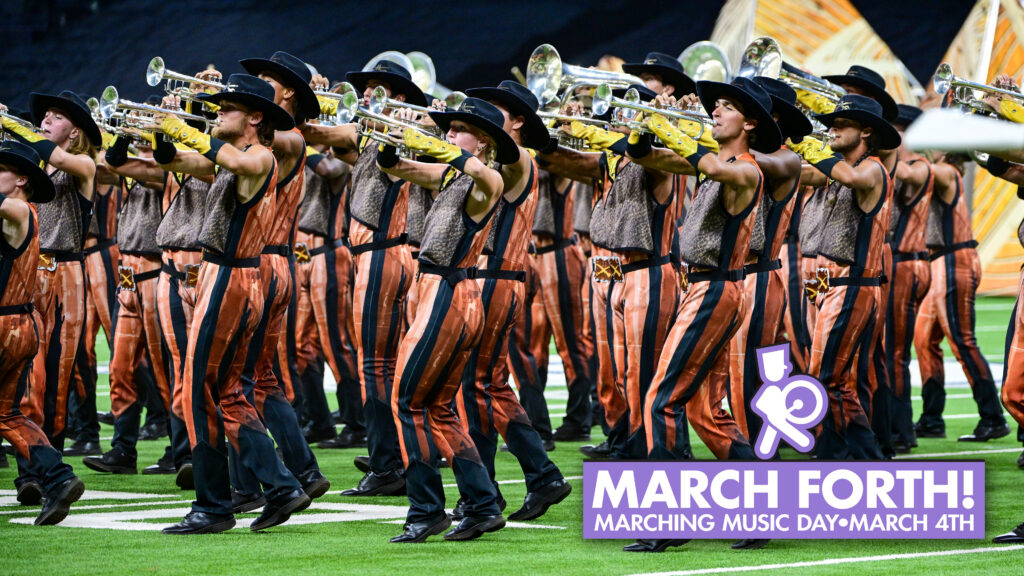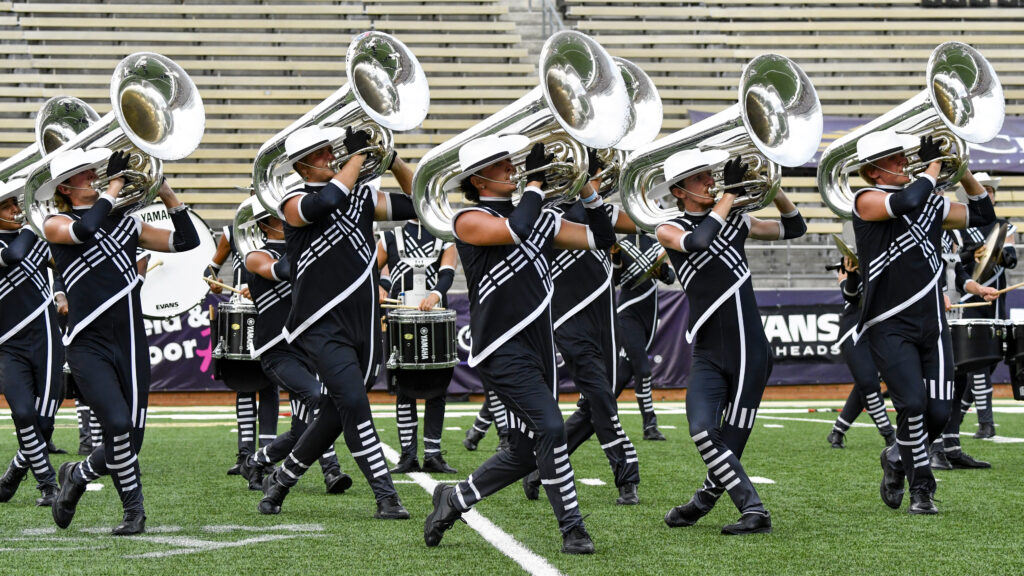It’s no secret that being in a drum corps can be a rewarding experience, but it can also be full of challenges. Because of this, many individuals participate for just a year or two. However, some are fortunate enough to be able to march for years, reluctantly leaving only because they’ve reached their final year of eligibility and “aged out.” What draws these “veterans” back to corps year after year, and how has it enriched their lives?
The Trip Begins
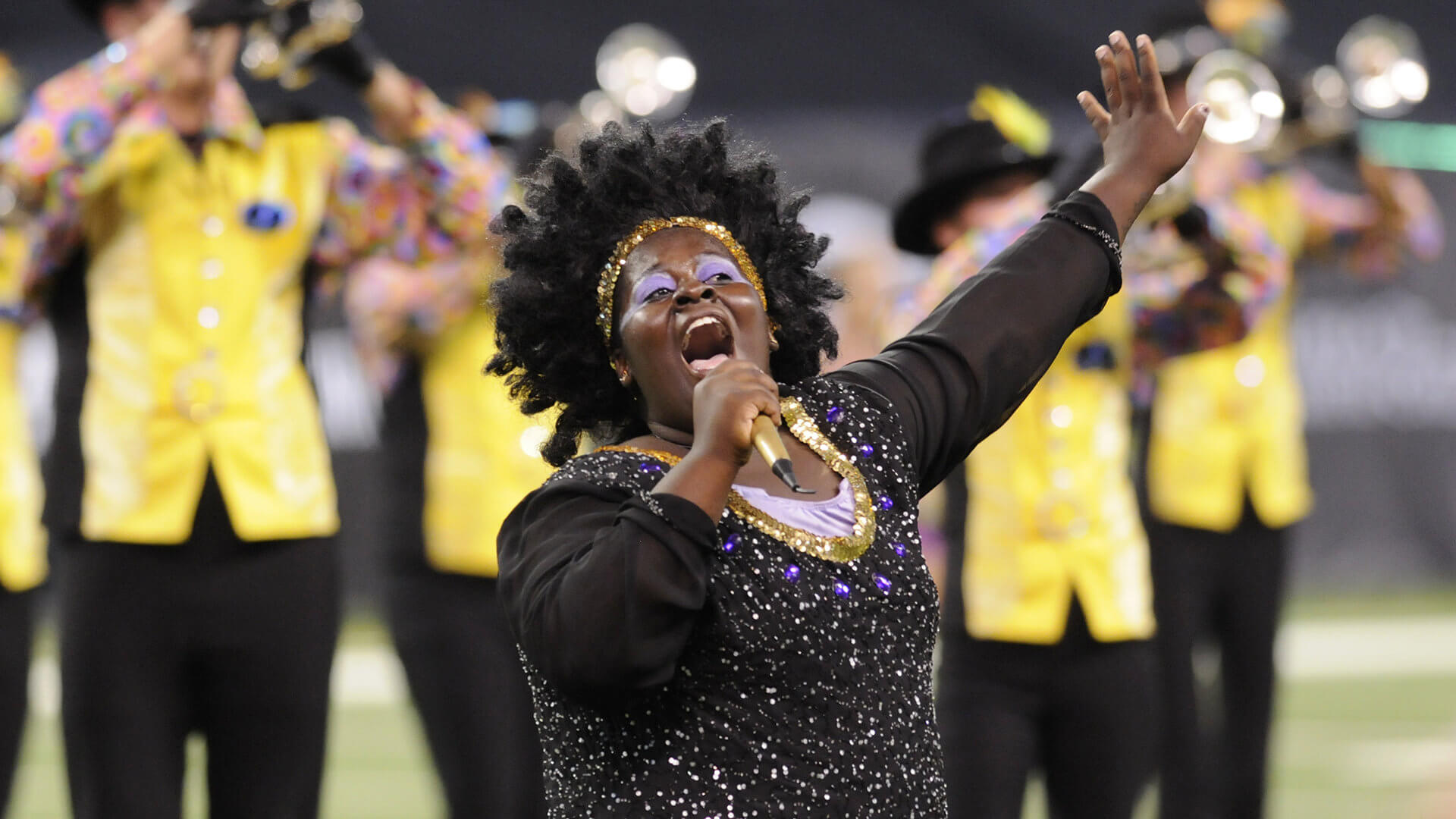
Maybe the best place to start answering these questions is by asking one more: What got you into drum corps in the first place? Erika Plez, a six-year member and three-year captain of the Jersey Surf color guard, explains that she joined the corps “because my friend had marched in the corps the year before I joined, and he bragged about how good they were and how family-oriented the people were.”
That word “family” keeps getting repeated when you talk to long-term corps members. Sometimes it’s not just a concept but the literal truth. “My dad marched in Santa Clara back in the late ’70s,” says Santa Clara Vanguard brass player Ken Nakamoto, who previously marched with the Open Class Vanguard Cadets. He aged out of the Vanguard A Corps this past summer with six years’ experience between the two groups. “Dad was the reason why I fell in love with the corps, and it is such an awesome feeling to carry on a family legacy.”
For Noah Koch, who finished his ninth year with Legends in August, the situation is similar. “I’m the youngest of five children,” he says, “and all five of us marched with Legends in the summer of 2008. I was drawn to Legends initially because my biological family was there, but through my time touring that first summer my family grew to encompass each member of the corps … People grow closer when they overcome challenges together, and that’s exactly what drum corps is all about.”
Navigating Bumps in the Road

Ah yes, the challenges: There are plenty of those while touring the country with a drum corps! “You never know when the buses will break down, unexpected weather will come, or the showers at a housing site won’t work,” remarks David Warren, conductor of Phantom Regiment for the past five years. “I’ve learned that challenges are good when you’re on tour. The most challenging days are always the ones that we remember. They are the days when we had to come together and really function as one unit, and through that we grow as an organization.”
Sometimes, just learning the ropes can be tough. “In high school when I auditioned for the Vanguard Cadets, I rolled into the audition not knowing how to march at all,” Ken Nakamoto notes. “My high school did not have a marching band, so being part of a drum corps was my first and only marching experience until I got to college. For the first few years, even leading into my first year with the Vanguard, I always felt like the weakest link; everyone knew what to do while I stood there completely confused. I did not feel confident until my second year.”
Physical injuries can be another common (and serious) problem that corps members face. Noah Koch has worked through back problems, as well as Achilles and forearm tendon issues. Erika Plez has had ankle injuries to contend with, but “the staff at my corps always made sure that I was all right. That’s what I like the most about the staff: When it comes to issues like this, they care about helping you.” Plez also notes that “there are times when I have to balance working and attending rehearsal camps. Sometimes it can be hard to get your boss to let you miss full weekends of work and then a full summer on top of that while doing drum corps.”
For Zach Sheller, a member of the Madison Scouts for five years (the last two as drum major), the challenges of drum corps have been especially significant. “The biggest hurdle I had to overcome personally was back in 2013,” he says. “I had been asked to play euphonium for that season—my first time with the instrument. It was difficult for me physically because I was born with a birth defect called Poland’s syndrome that disfigured my left hand. Along with that, I’m missing some muscle mass in my left arm and my entire left pectoral muscle. That year was the roughest spring training I’ve ever had. I suffered from muscle and back pain throughout the season. What really drove me to push through the summer, though, is that I didn’t want people to think I was different from anyone else nor give me special treatment. I felt like I had to be better than someone who could play the euphonium ‘normally’ and even surpass the abilities of the other guys in my section.”
Keep On Keeping On
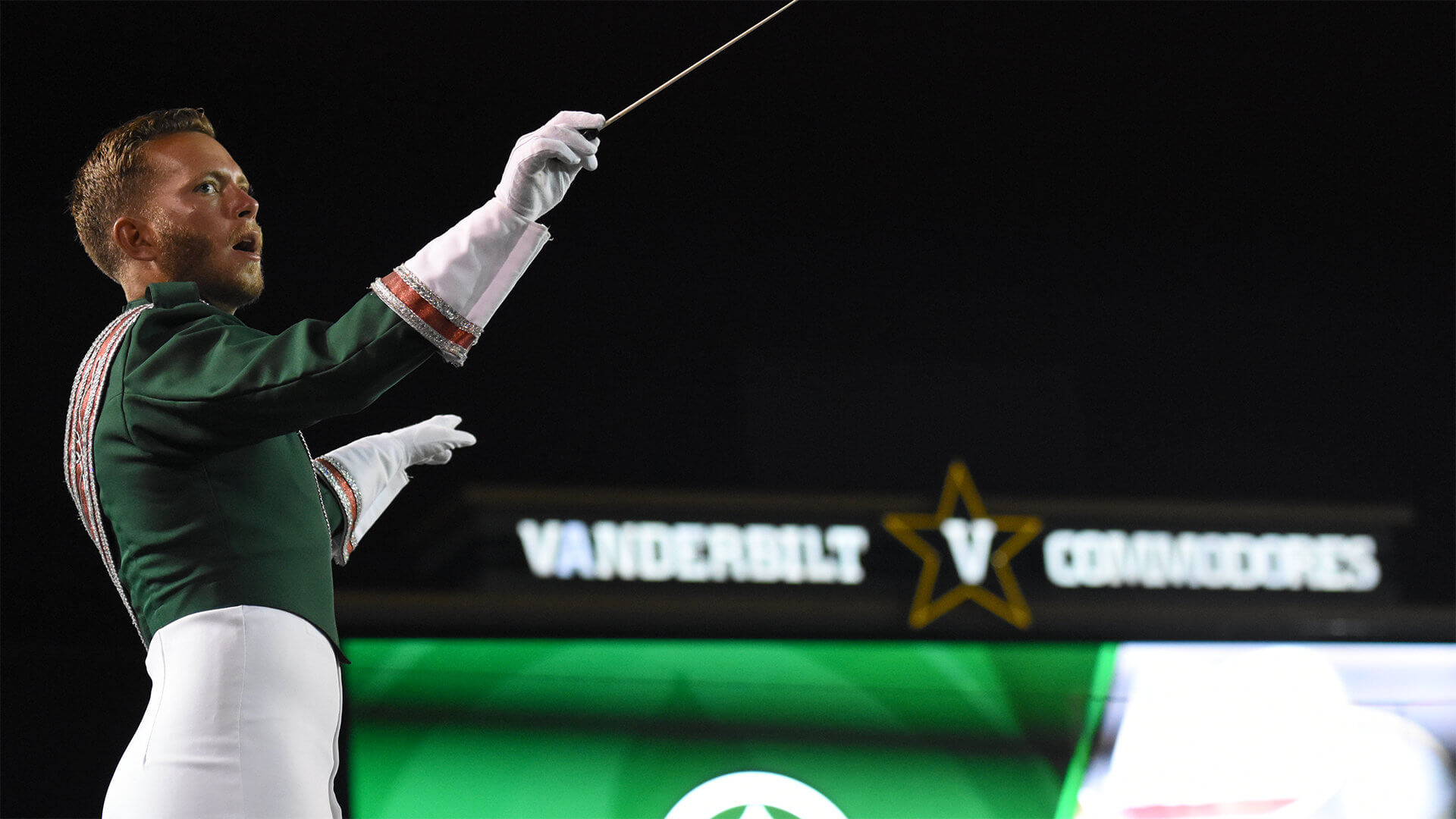
It clearly takes hard work, determination, and sometimes outside help to stick with a corps for the long haul, but the rewards are great. “As clichéd as it sounds, ‘There’s no place like home,’” Sheller says. “I love the Madison Scouts. I would do anything for the corps and my brothers. It’s one of the reasons I’m a drum major now.”
Ken Nakamoto responds with similar enthusiasm: “I grew up with this drum corps and I absolutely love this corps. What keeps me coming back to the Vanguard is my love for this organization.” And Erika Plez says, “What I get out of coming back is a bigger and bigger family every year. These people in the corps and the people who run it are not just staff: They are role models, and great people to look up to. It’s amazing coming back to the Surf because I feel like I’m walking into my home.”
“The relationships that are formed through shared experiences are ones that last,” Noah Koch remarks. “I love the people who make up Legends. Over time, I began to realize that I was capable of giving back to the organization that gave so much to me. As a veteran of the corps, I could set a positive example for the younger members of the group, showing them how to pursue excellence through their time with Legends. I have grown to focus more on giving of myself to the group rather than focusing on what the group can give back to me. I know I’m not perfect, and I still have so much to learn, but if there is any way I can help those around me, I will do it.”
The opportunity for personal growth is one reason why David Warren has kept coming back: “Every summer you learn so much about yourself, and you grow so much as a person. That means every time you start a new summer, you take it on with a different perspective than you did the year before. Of course, the people who I’m around every single day are a huge inspiration to me in coming back to the corps every year. It is very rare in life that you find 149 other people who you know are supporting you no matter what … I love every single thing about this organization, I can’t imagine what my life would be without it.”
Things Learned Along the Way
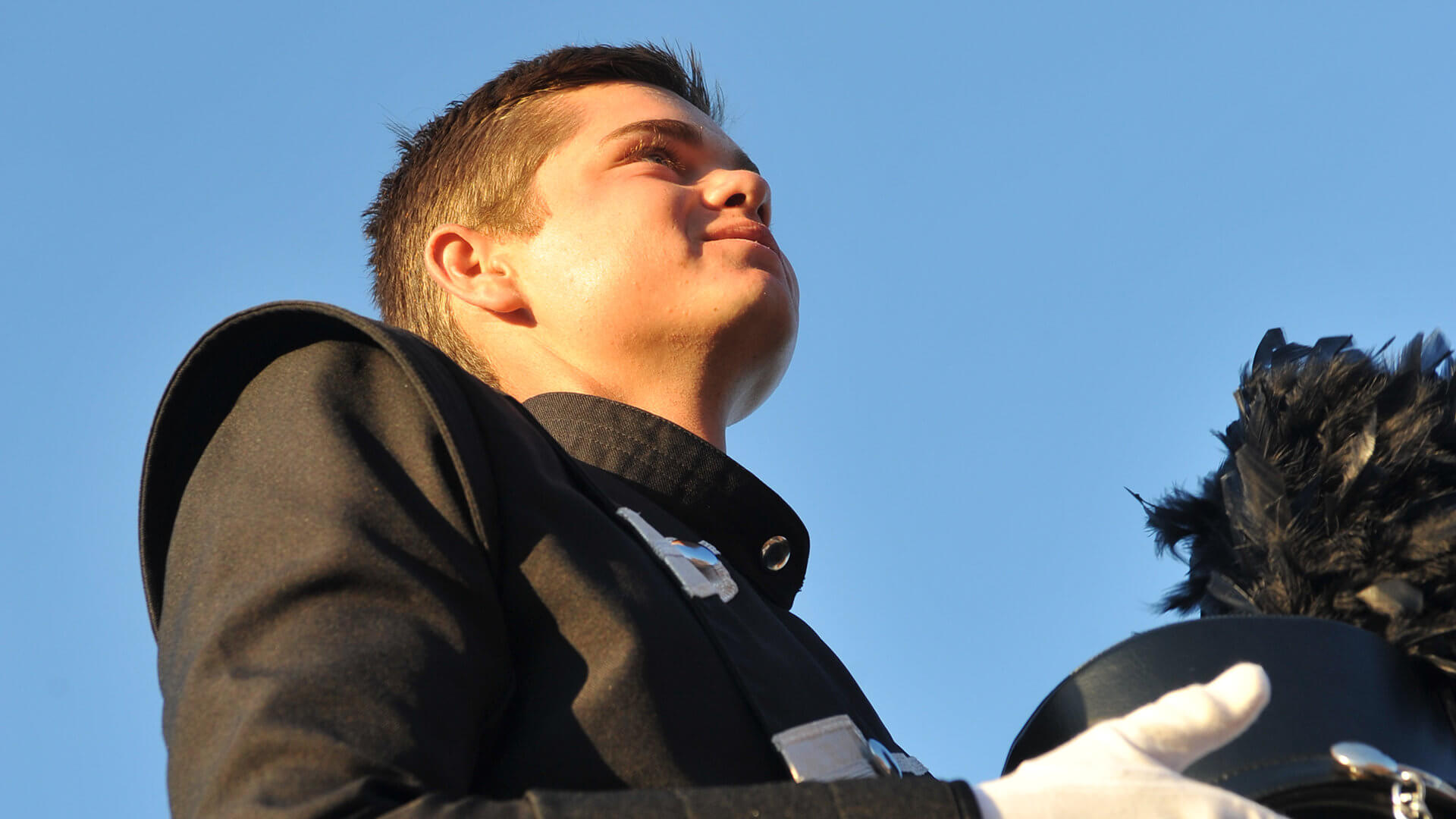
What people learn through the drum corps experience can change them, in ways that may last a lifetime. This is particularly true for long-term members. “Throughout my years in the drum corps I have come to realize that the process of pursuing goals, the moment-by-moment choice to get better, takes precedence over the finished product,” Noah Koch says. “I’ve learned that if I invest myself into the daily process of pursuing my personal best, whatever goals I have will become far more achievable and fulfilling.”
The challenge of playing in a corps can push members to their limits, and bring to the fore qualities that might have been previously hidden or unrefined. Zach Sheller reports, “There’s a saying that one of our staff members has been preaching to us: Drum corps doesn’t change you—it just reveals your true potential.” Ken Nakamoto thinks the same: “Being in a drum corps has shown me what my true capabilities can be … Drum corps has taught me to persevere and never give up. If life knocks you down on your butt, you get back up on your feet and keep fighting.”
Fighting to pursue your dreams, both as an individual and as a group, is part of a corps’ heart and soul. “The greatest thing that drum corps has taught me,” David Warren says, “is that no matter how crazy your dreams may seem, don’t let anything get in the way of achieving them. Becoming a conductor seemed impossible when I first considered auditioning for that position at Phantom Regiment. The process taught me that with a lot of hard work, and believing in myself, I could accomplish anything.”
Looking Back From Journey’s End

As these die-hard members age out and move on, what will they miss most about their years spent with their corps? For Ken Nakamoto, “What I’ll miss the most is being able to spend a whole summer with 149 other people in close quarters. As crazy as that may sound, those 149 people become a part of your family as you live with them for three whole months.”
This, really, is the essence of why these “old-timers” have come back, year after year: The corps is family. “There is no other feeling like performing with the community of people who mean the most to you in the world,” Noah Koch says.
The Legends veteran adds that the chance to be a positive role model to others is nearly as rewarding. “You can be an invaluable resource to those around you who are experiencing corps for the first time,” he notes. “Be their friend, mentor, and guide; set the example for them so that they can learn. Through teaching others you will continue to be pushed to learn and grow.”
Zach Sheller also understands that a long-term corps member has a special responsibility to younger members: “The day will come when you look up to see who’s leading you, but instead you have to look around to see everyone else looking to you. Whether you’re given a leadership role or not, people will look at you. Do the right thing and be the epitome of your corps’ ideals.”
Joining that larger corps family, and learning how to lead the way for its younger members, gives a real sense of belonging and purpose to these seasoned performers. “We all have that moment where we realize that the drum corps activity is the place where we were meant to be,” David Warren says. “I use that as inspiration every single day.”
As Erika Plez puts it, “Joining drum corps was the best decision I ever made … Life is hard, drum corps is hard, but it’s fun and worth it at the end!”



